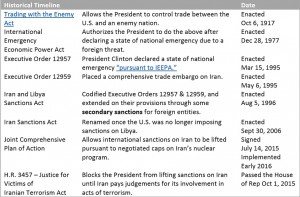
Who Wields Iranian Sanctions Authority?
On December 28, 1977, the International Emergency Economic Powers Act (IEEPA) was signed into law, which allows a president to intervene in any U.S. business transactions with a foreign entity if a state of emergency is declared. President Bill Clinton declared in Executive Order 12957 a state of “national emergency,” on March 15, 1995, to prohibit certain transactions with Iran, and this state of emergency has been renewed every year since by a U.S. president. The Iran and Libya Sanctions Act of 1996, later renamed the Iran Sanctions Act (ISA), was introduced “to deny Iran the ability to support acts of international terrorism and to fund the development and acquisition of weapons of mass destruction,” and the act has been reproduced in various capacities every couple of years by executive orders and codified by Congress.
U.S. economic pressure has primarily been exercised through primary sanctions, which bar U.S. citizens and entities from engaging in economic transactions with a “rogue regime, terrorist group, or other international pariah.” Secondary sanctions provide great incentive for foreign nations, entities, and individuals not to do business with the implicated actor by cutting them off from participation in the U.S. economic sphere. They are also a means of last resort before escalating to military force because they apply extra pressure and isolate the foreign entity from the international community.
These sanctions essentially cultivate an atmosphere of fear around doing business with the implicated actor, and with the U.S.’s great economic reach, these sanctions can provide a crushing blow to any nation’s economy. Iran’s rial depreciated by more than 66% by June 2013 due to these intense sanctions that cutoff nearly all trade for Iran with the U.S., the EU, and many nations throughout the world in which the U.S. wields influence.
Some members of congress are looking to put extending the ISA on the agenda, so that the U.S. has a clear path to ‘snapback’ sanctions should Iran not abide by the nuclear agreement. The current ISA is set to ‘sunset’ at the end of 2016, and so doing would lift many U.S. laws codifying sanctions against Iran. This is not to say, however, that the U.S. would be unable to impose sanctions quickly because much of the sanctions power lies with the president.
Executive orders have directed U.S. foreign policy on this matter for many years with congress codifying the actions already being taken into law after the fact. In May 1995, Executive Order 12959, Prohibiting Certain Transactions with Respect to Iran, was not codified into law until the Iran and Libya Sanctions Act of 1996, and yet they were implemented the whole time. This gives credence to the White House’s argument that the ISA does not have to be renewed right now because the president has the tools to enforce repercussions if Iran reneges.
Renewing the ISA would not hinder the president’s ability to lift Iranian sanctions as agreed to in the Joint Comprehensive Plan of Action (JCPOA), but a new U.S. law could. A congressional bill that passed the House on October 1, 2015, H.R. 3457 or the Justice for Victims of Iranian Terrorism Act, would “prohibit the lifting of sanctions on Iran until the Government of Iran pays the judgements against it for acts of terrorism, and for other purposes.” The White House stated they would veto such a bill because it would impede the U.S. government’s ability to adhere to the JCPOA, and would result in the “collapse” of the JCPOA; leaving Iran’s nuclear program with far fewer limitations.
Iran provided the IAEA with responses to the IAEA’s questions about the Possible Military Dimensions (PMDs) of its past nuclear program today, October 15, and IAEA board members will present its assessment of this report on December 15. Iran is now set to begin curbing its nuclear program on Sunday October 18, “Adoption Day,” but H.R. 3457’s introduction to Congress jeopardizes this process. The commitment by the P5+1 and Iran to the nuclear agreement is demonstrated by every major deadline of the nuclear agreement being met thus far, which is vital to the agreement coming to fruition. The IAEA’s new understanding of Iran’s previous capabilities is indispensable to implementing the necessary nuclear safeguards on Iran’s program and ensuring global security. The agreement is yielding many positive outcomes, and subverting bills like H.R. 3457 should be shelved.






